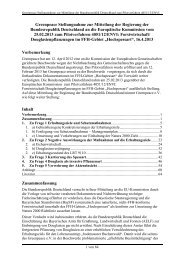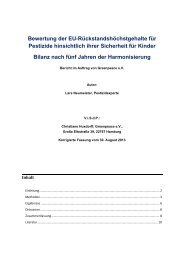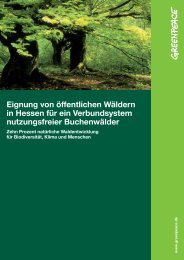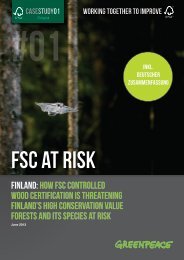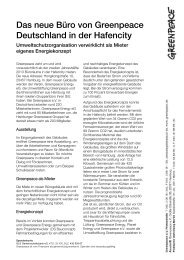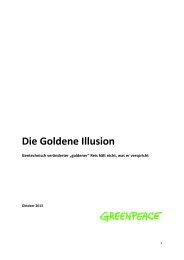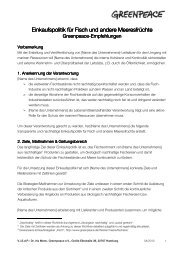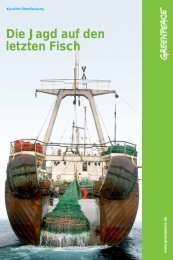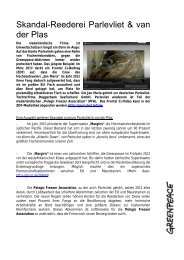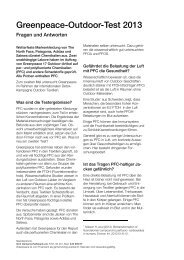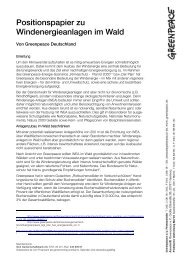Untitled - Greenpeace
Untitled - Greenpeace
Untitled - Greenpeace
You also want an ePaper? Increase the reach of your titles
YUMPU automatically turns print PDFs into web optimized ePapers that Google loves.
CARVING UP THE CONGO<br />
11<br />
Tropical rainforest destruction and climate<br />
change 6 are two fundamental drivers<br />
responsible for the world entering a period of<br />
mass species extinction on a scale not seen<br />
since the age of the dinosaurs. 7<br />
Climate change is the greatest threat the<br />
world faces today. This global problem<br />
demands a global solution. In February 2007,<br />
a new report 8 from the Intergovernmental<br />
Panel on Climate Change (IPCC) underlined the<br />
case for immediate action to reduce all sources<br />
of climate changing GHG emissions, including<br />
deforestation and degradation of forested<br />
land. 9 By storing carbon, forests play a<br />
powerful role in mitigating the growing<br />
instability of the climate.<br />
‘There is a growing consensus<br />
that the traditional<br />
concession-based industrial<br />
logging model does not<br />
generate the desired<br />
economic, social and<br />
environmental benefits.’ 5<br />
Baroness Amos, Leader of the<br />
UK Government House of<br />
Lords and UK Government<br />
spokesperson on international<br />
development, 2006<br />
The Congo rainforests of Central Africa form<br />
the second largest remaining block of largely<br />
intact tropical forest in the world. Yet these<br />
globally critical carbon reserves are rapidly<br />
being degraded both by deforestation and by<br />
forest fragmentation – fifty million hectares<br />
of rainforest is being carved up by logging<br />
companies in Central Africa 10 (that is an area<br />
the size of Spain) – and important carbon<br />
stocks lost.<br />
The recent return of peace in the Democratic<br />
Republic of the Congo (DRC), the holding of<br />
democratic elections for the first time in the<br />
country’s history and the review of the legality<br />
of current forestry titles provide a unique<br />
opportunity for the international community<br />
to support genuine development in one of the<br />
world’s poorest countries and take critical<br />
action to protect the global climate.<br />
The recovery of the logging industry is probably<br />
the most significant change impacting the<br />
DRC’s forests in the post-war period. 11<br />
Agencies such as the World Bank are using<br />
their enormous financial influence to impose<br />
strategies for economic development on<br />
countries such as the DRC. The DRC’s rich<br />
rainforest and mineral resources, the main<br />
stakes of its recent wars, are now at the core<br />
of donor organisations’ assumptions about<br />
reconstruction. They are viewed as a quick<br />
source of tax revenue and foreign earnings to<br />
kick-start the country’s collapsed economy,<br />
and thereby, supposedly, to lift the country’s<br />
people out of poverty. 12<br />
©<strong>Greenpeace</strong>/Davison



